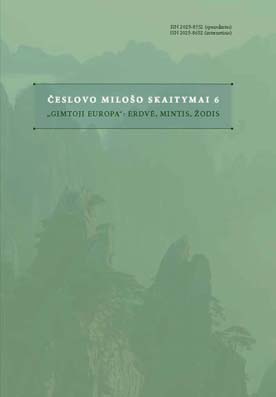Senosios rusų valstybės susikūrimas (XX a. Istoriografijos Bruožai)
The Issue of the Formation of the Ancient Russian State in the 20 th Century Historiography
Author(s): Povilas LasinskasSubject(s): Literary Texts
Published by: Vytauto Didžiojo Universitetas
Keywords: Russian history; 20th century historiography; early feudalism
Summary/Abstract: The objective of the research on the formation of the ancient Russian state has been to describe the character of the economic and communal relations of the East Slavs at the time of the state formation. The 20th century historiographers have considered the formation of the ancient Russian state as the result of lengthy consolidation process of the East Slavs that took place in the 2nd half of the 1st millennium of our era. It has been proved that the Normans did not have a significant influence on the formation of the East Slavic state. Most scholars have recognized the existence of early feudal system. The wide ethnical illustration of the East Slavs has been presented, the place of the East Slavs in the system of the European nations has been determined, and their culture and daily life have been researched. The 20th century historiographers have tended to advance the genesis of the statehood of ancient Rus by several ages. The first steps in this direction were done by Grekov and Rybakov and some Lithuanian historians used the same path. Thus, the advancement of the statehood in accordance with the results of the analysis of social-economic development is characteristic to historiography. At the same time it cannot be left unnoticed that the researchers of the ancient Russian history have not reached the unanimous opinion on some principal issues. Though the diversity of opinions helps to cover more aspects of the ancient Slavs life, the contradictory conceptions (about patrimonies and state feudalism, feudal-national, pre-feudal and slaveholding statehood) often cannot be accepted. Perhaps the truth lies somewhere in the middle or one of these conceptions is more correct. At first glance, it may seem that these disagreements exist due to the lack of sources and that their further accumulation will allow explaining a lot, eliminating the disagreements. However, many historiographers have attempted to use the new data to substantiate their attitude formed on the basis of the earlier known sources. It is clear that this is not the best research method, thus the task has emerged to replace the very method of solution to the problem. Nowadays similar methodological problems are relevant not only to the researchers of the discussed issue – they are of the global character.
Journal: Česlovo Milošo skaitymai
- Issue Year: 2013
- Issue No: 6
- Page Range: 162-174
- Page Count: 13
- Language: Lithuanian

